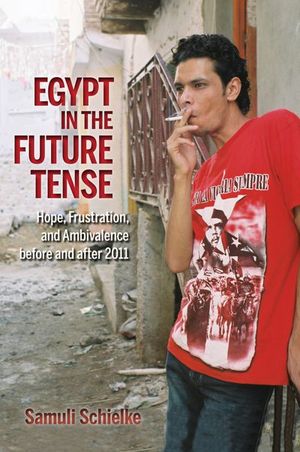Egypt in the Future Tense
Published by Indiana University Press
“Illustrates the complex and contradictory impact of Muslim revivalism on the expectations and hopes of Egyptian youth . . . Recommended.” —Choice
Against the backdrop of the revolutionary uprisings of 2011–2013, Samuli Schielke asks how ordinary Egyptians confront the great promises and grand schemes of religious commitment, middle class respectability, romantic love, and political ideologies in their daily lives, and how they make sense of the existential anxieties and stalled expectations that inevitably accompany such hopes. Drawing on many years of study in Egypt and the life stories of rural, lower-middle-class men before and after the revolution, Schielke views recent events in ways that are both historically deep and personal. Schielke challenges prevailing views of Muslim piety, showing that religious lives are part of a much more complex lived experience.
“This wonderful book brings fresh insights into the anthropology of hope in general and Egypt in particular. It makes a rewarding read for scholars interested in how life and all its ambiguities and aspirations unfold under changing notions of religious commitment, new regimes of circulation, and emerging patterns of consumption.” —American Anthropologist
“An altogether innovative, compelling, and sensitive perspective on what is perhaps the most important question facing young people in the Middle East today: how to make a life in rapidly shifting, complex times whose future is uncertain.” —Jessica Winegar, author of Creative Reckonings: The Politics of Art and Culture in Contemporary Egypt
Against the backdrop of the revolutionary uprisings of 2011–2013, Samuli Schielke asks how ordinary Egyptians confront the great promises and grand schemes of religious commitment, middle class respectability, romantic love, and political ideologies in their daily lives, and how they make sense of the existential anxieties and stalled expectations that inevitably accompany such hopes. Drawing on many years of study in Egypt and the life stories of rural, lower-middle-class men before and after the revolution, Schielke views recent events in ways that are both historically deep and personal. Schielke challenges prevailing views of Muslim piety, showing that religious lives are part of a much more complex lived experience.
“This wonderful book brings fresh insights into the anthropology of hope in general and Egypt in particular. It makes a rewarding read for scholars interested in how life and all its ambiguities and aspirations unfold under changing notions of religious commitment, new regimes of circulation, and emerging patterns of consumption.” —American Anthropologist
“An altogether innovative, compelling, and sensitive perspective on what is perhaps the most important question facing young people in the Middle East today: how to make a life in rapidly shifting, complex times whose future is uncertain.” —Jessica Winegar, author of Creative Reckonings: The Politics of Art and Culture in Contemporary Egypt
BUY NOW FROM
COMMUNITY REVIEWS

